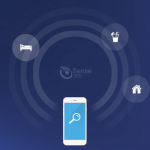 The amount of data produced by ones mobile phone has mushroomed in recent years, with all manner of applications for this data, whether it’s helping us keep track of our physical and mental health, or tracking our travel patterns or many other uses.
The amount of data produced by ones mobile phone has mushroomed in recent years, with all manner of applications for this data, whether it’s helping us keep track of our physical and mental health, or tracking our travel patterns or many other uses.
It seems likely, therefore, that a key challenge in future will be in constructing open platforms that allow this data to be used across applications. For instance, in healthcare, it will be crucial to ensure that the data we generate on our phones is compatible with our patient records held by our doctors.
A mobile data commons
One startup that is looking to help accomplish this is Sense360, which endeavors to make it much easier for apps to make use of the data generated by phones.
The platform collects data from the numerous sensors in our phones, whether that’s from our accelerometer, our gyroscope, our GPS or the various other sensors our phone is equipped with.
This data is then processed according to the needs of app developers. They then add a few lines of code to the backend that allows Sense360 to access the raw data collected from the phone. An algorithm is then used to sort through the data and isolate the desired sensor data to help app developers use it in unique ways.
The platform has been developed to be as unobtrusive as possible, so it won’t drain the battery of the phone or get in the way of normal activities. Instead, it will operate in the background, simply processing the anonymous data that is produced automatically by the phone.
Early stages
During their beta testing, the platform worked with the likes of Walla.by, who alert users to cash-back opportunities when they use their credit cards at various locations.
With all data anonymous, the developers hope to allay any security and privacy issues that users may have, as it’s impossible to identify users from the data your sensors give off.
The platform has already raised several million dollars in venture funding, with some big name backers on board. They hope to have created a platform whereby it is easy and intuitive for technologies to interact with one another, thus making the end user experience a better one.
It’s certainly a tool that’s worth keeping an eye on.
The thing is, this whole argument around companies like this not knowing who we are based upon the data has been made so many times before, and each time it's actually proved really easy to see who we are from this meta data. And to be honest, that worries me greatly.